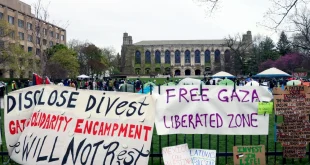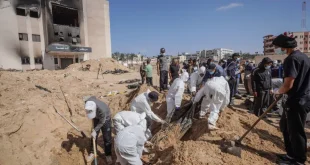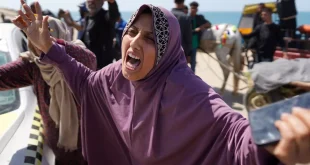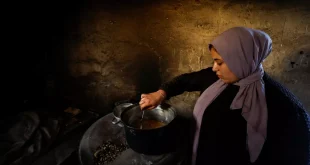Israel has intensifed its attacks against Gaza hospitals. (Photo: Waleed Musleh, via Social Media)
By Palestine Chronicle Staff
Hospitals are barely functioning in Gaza, according to the UN Under-Secretary-General for Humanitarian Affairs and Emergency Relief Coordinator, Martin Griffiths.
The United Nations relief chief, Martin Griffiths, has warned that Gaza is a public health disaster in the making, with the World Health Organization (WHO) urging the Security Council to turn its recent humanitarian resolution into reality.
“Hospitals are barely functioning,” said Griffiths, the UN Under-Secretary-General for Humanitarian Affairs and Emergency Relief Coordinator.
“Infectious diseases are rife and spreading fast in overcrowded shelters,” he added, while “hundreds of people with war injuries are unable to receive care.
“Gaza is a public health disaster in the making,” the relief coordinator stressed.
Meanwhile, Dr. Tedros Adhanom Ghebreyesus, WHO Director-General, repeated his call on the international community “to take urgent to alleviate the grave peril facing the population of Gaza and jeopardizing the ability of humanitarian workers to help people with terrible injuries, acute hunger, and at severe risk of disease.”
“Day after day, the needs of Gaza’s war-ravaged war-ravaged people grow. Peril, ill-health, hunger, thirst, lack of shelter—these should not be the norm for millions of people. But sadly, they are,” Ghebreyesus stressed.
High-risk Missions to Deliver Aid to Hospitals
He said the WHO and its partners undertook high-risk missions to deliver supplies to hospitals in northern and southern Gaza on Tuesday, December 26.
Missions visited Al-Shifa Hospital in the north and Al-Amal Palestine Red Crescent in the south.
Both hospitals also serve as shelters for displaced people seeking relative safety. At Al-Shifa Hospital, a reported 50,000 people are sheltering, while in Al-Amal there are 14,000, the WHO said in a statement.
At Al-Shifa, WHO delivered fuel to keep essential health services running. With UNICEF, WHO also delivered medical supplies for the hospital. And in support of NGO partner, the World Central Kitchen, delivered materials to support a kitchen at Al-Shifa.
At Al-Amal, WHO staff saw the aftermath of recent strikes that disabled the hospital’s radio tower and impacted the central ambulance dispatch system for the entire Khan Younis area affecting more than 1.5 million people, the statement said.
“Of the 9 ambulances the hospital once had, only 5 remain functioning.”
WHO staff reported finding it impossible to walk inside the hospital without stepping over patients and those seeking refuge.
“There are only a few functioning toilets available in the hospital and adjacent community buildings and PRCS training centers for the people taking refuge there, staff and hospital patients,” it said.
Displacement Leading to Overcrowding, Diseases
While transiting across Gaza, WHO staff witnessed tens of thousands of people fleeing heavy strikes in the Khan Younis and Middle Area, on foot, riding on donkeys, or in cars. Make-shift shelters were being built along the road.
“WHO is extremely concerned that this fresh displacement of people will further strain health facilities in the south, which are already struggling to meet the population’s immense needs,” said Dr Rik Peeperkorn, WHO Representative in WHO’s office for the West Bank and Gaza.
“This forced mass movement of people will also lead to more overcrowding, increased risk of infectious diseases, and make it even harder to deliver humanitarian aid.”
Hospitals Barely Functioning
According to the latest WHO assessments, Gaza has 13 partially functioning hospitals, 2 minimally functioning ones, and 21 that are not functioning at all.
Among these is Nasser Medical Complex, which is the most important referral hospital in Southern Gaza, and is partially functioning.
The WHO said recent reports of residential areas being ordered to evacuate around the hospital are extremely concerning.
“When military activities intensify near the hospital, ambulances, patients, staff, and WHO and partners will be unable to reach the complex, and this key hospital will quickly become barely functional,” said Dr Peeperkorn.
“This scenario was witnessed all too often in the North. Gaza can not afford to lose any more hospitals. WHO is working to strengthen and expand the existing struggling health system.”
Hunger Leading to Desperation
WHO staff also reported that “hungry people again stopped our convoys today in the hope of finding food.”
It said its ability to supply medicines, medical supplies, and fuel to hospitals “is being increasingly constrained by the hunger and desperation of people en route to, and within, hospitals we reach.”
Dr. Ghebreyesus said: “The safety of our staff and continuity of operations depends on more food arriving in all of Gaza, immediately.”
“My own colleagues are also being directly and personally affected by the conflict, just like virtually everyone in Gaza. I continue to receive heart-breaking news of the loss of our Gaza staffers’ family members.”
“The recent United Nations Security Council resolution appeared to provide hope of an improvement in humanitarian aid distribution within Gaza,” Dr. Ghebreyesus added.
“However, based on WHO eyewitness accounts on the ground, the resolution is tragically yet to have an impact. What we urgently need, right now, is a ceasefire to spare civilians from further violence and begin the long road towards reconstruction and peace.”
According to Gaza’s Ministry of Health, 21,320 Palestinians have been killed, and 55,603 wounded in Israel’s ongoing genocide in Gaza starting on October 7. Palestinian and international estimates say that the majority of those killed and wounded are women and children.
(The Palestine Chronicle)
 Sri lanka Muslims Web Portal Diversity and Inclusiveness
Sri lanka Muslims Web Portal Diversity and Inclusiveness



